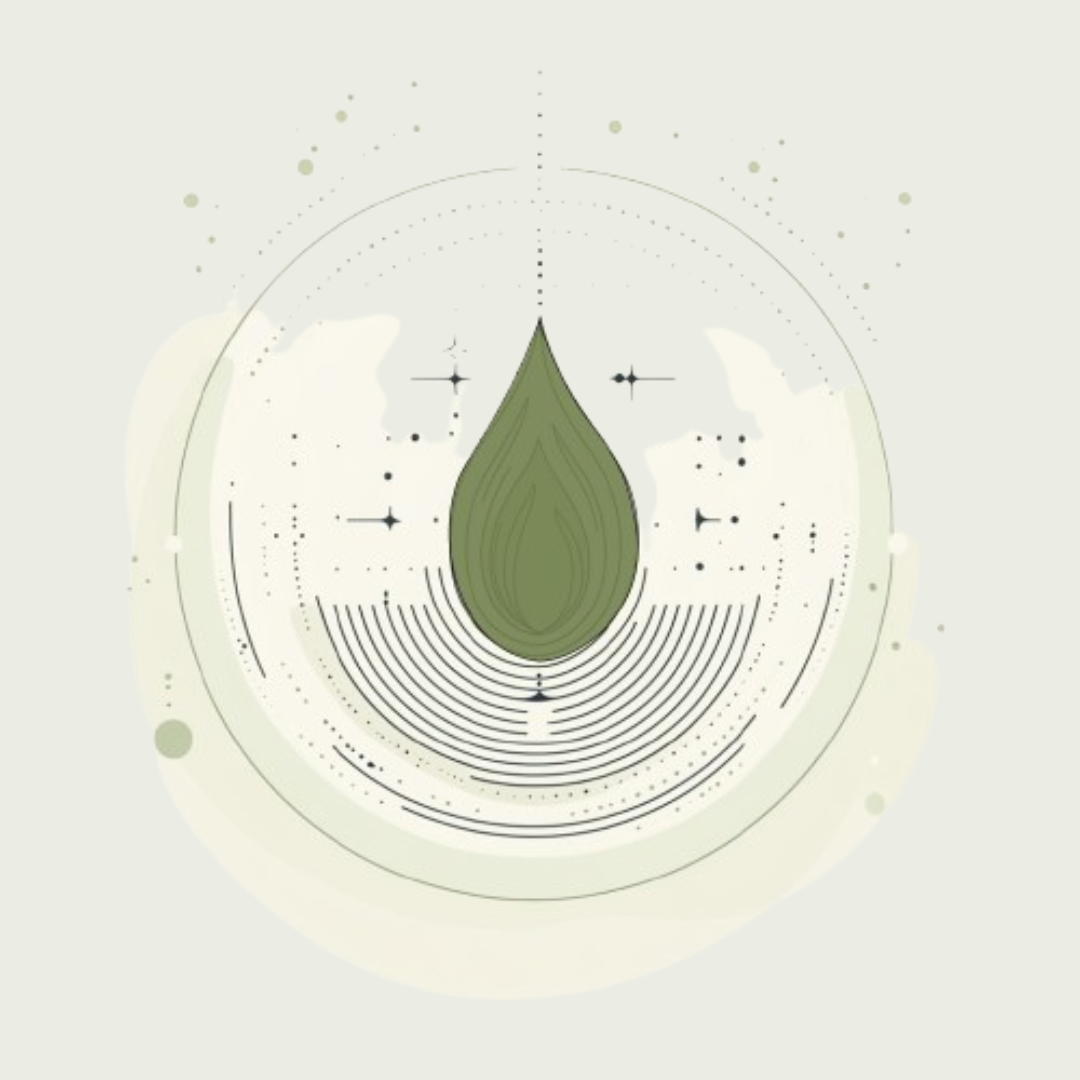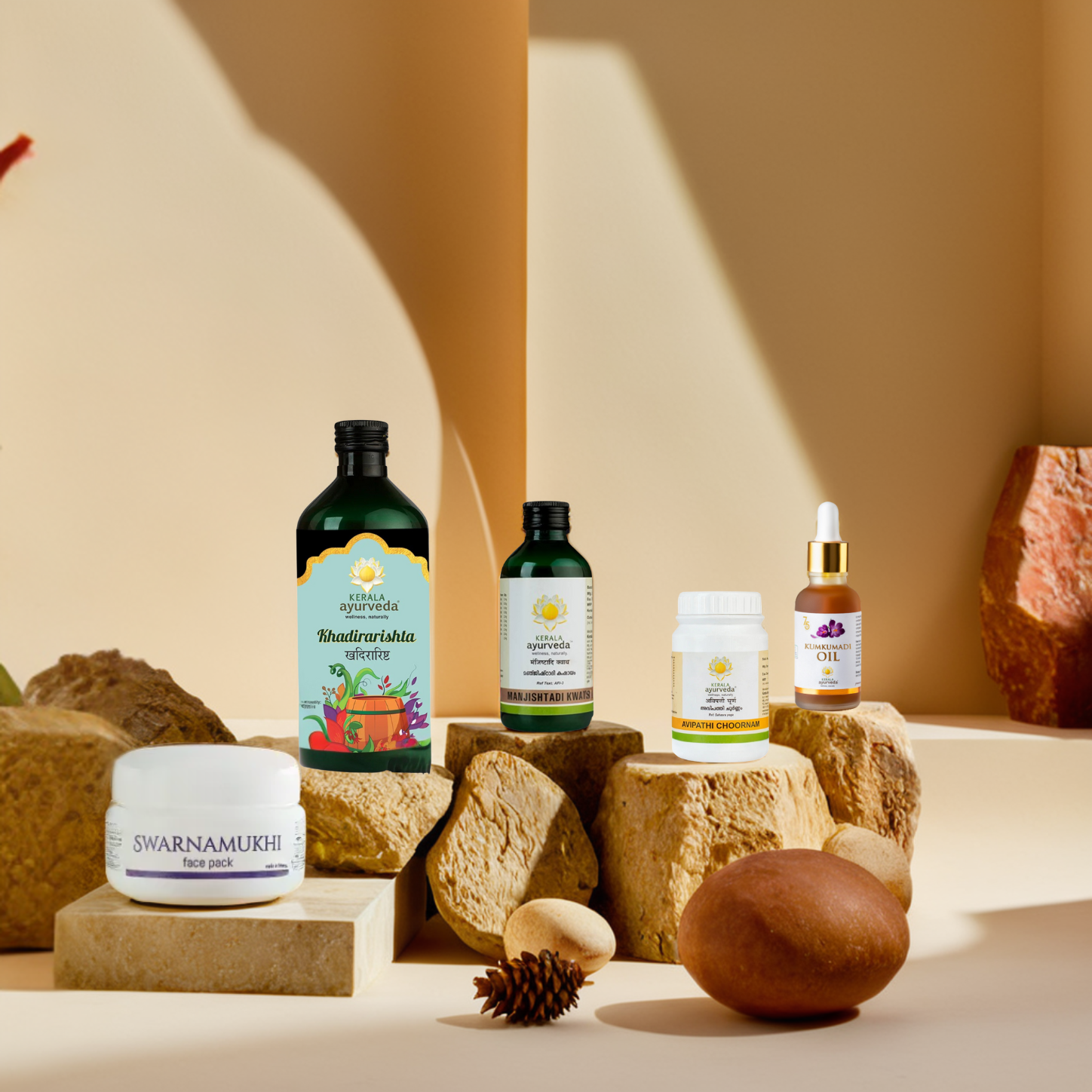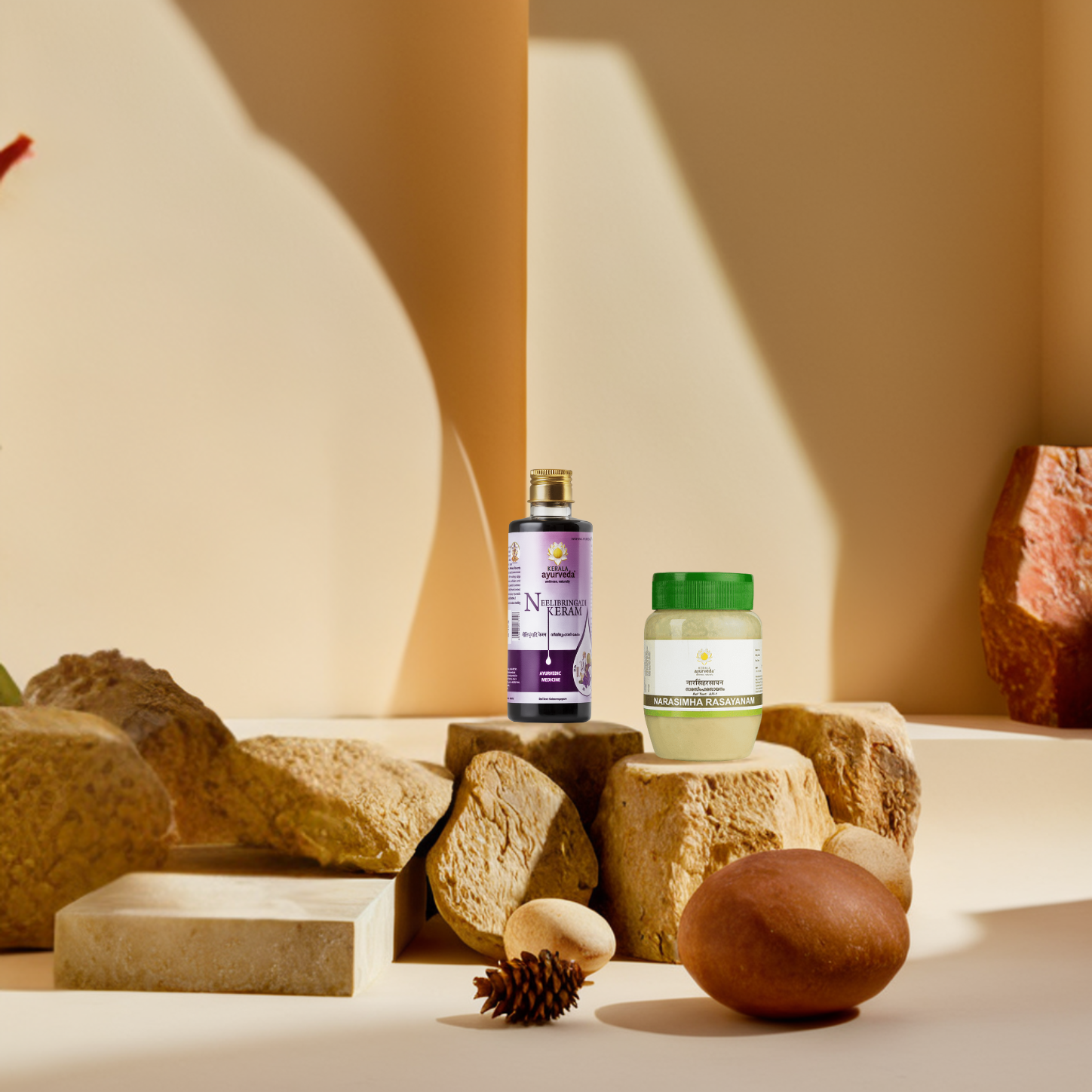You wash your face twice a day, stay away from oily food, and try every trending face mask, yet those stubborn breakouts keep coming back. It feels like you’re doing everything right, but your skin just won’t clear up. The truth is, acne isn’t always about what you put on your skin. Often, it’s what’s going on within that tells the real story.
The skin reflects your inner health more than we often realize. When your digestion is unusual, your sleep is disturbed, or you’re constantly under stress, your skin shows it. Add to that a mix of pollution, heat, and a rushed lifestyle, and breakouts can feel inevitable. That’s why a deeper, more connected approach is worth exploring.
Ayurveda sees skin not just as a surface to treat, but as a mirror of your internal balance, especially your Rasa Dhatu (plasma). When this first tissue gets affected, it can trigger issues in your skin’s clarity and glow. If you’ve tried everything topical and your acne still keeps returning, it might be time to listen to what your body is trying to say.
What is Acne?
Acne is a skin condition that develops when hair follicles become clogged with oil and dead skin cells. It often appears on the face, neck, chest, and back, where sebaceous (oil) glands are more active. These glands produce sebum to moisten the skin, but excess sebum, mixed with impurities, can block the pores. When bacteria enter the mix, inflammation and painful pimples begin.
While conventional treatment often focuses on drying out the skin or controlling oil production, Ayurveda looks deeper. Rather than just masking the symptoms, it focuses on identifying and treating the root cause. Acne in Ayurveda is known as Yauvanpidika, a condition commonly seen during adolescence, but increasingly prevalent in adults due to lifestyle and diet triggers.
Causes of Acne According to Ayurveda
Acne doesn’t appear out of nowhere. It’s the outcome of imbalances that slowly build up beneath the surface. Ayurveda explains this journey in a detailed yet practical way.
When your Agni (digestive fire) weakens, food isn’t digested properly. This leads to the formation of Ama (toxins), which start to accumulate in the body. Over time, this impairs the balance of doshas, especially Pitta and Kapha. As these doshas become aggravated, they affect the Rakta (blood) and Meda (fat) dhatus, both closely linked to skin health. Typical triggers include:
- Weak digestion and low Agni: Leads to toxin buildup
- Pitta-aggravating foods: Fried, sour, spicy, and fermented items
- Constipation or IBS: Disrupts toxin elimination and vitiates Pitta
- Oily scalp or unclean skin: External blockage of pores
- Hormonal changes: Common in adolescence or stress-heavy phases
This results in blocked srotas (channels), heated blood, and fat tissues mixing with toxins, all showing up as breakouts on your skin.
What Acne Looks Like on the Skin?
Acne doesn’t always look the same; it can appear as small bumps, painful nodules, or pus-filled pimples. Recognizing these signs early can help you manage breakouts more effectively. Here's what acne can look like on your skin. Ayurveda categorizes acne symptoms based on doshic influence:
- Whiteheads and blackheads: Typically linked to Kapha imbalance, thick, sticky sebum blocks the pores.
- Red, inflamed pimples: Point toward Pitta dominance, heat, and toxins inflaming the blood and skin tissues.
- Dry, scaly breakouts: Often connected to Vata imbalance, irregular digestion, and dehydration, affecting the skin’s nourishment.
The location, type, and severity of the acne often tell the story of which dosha needs to be addressed.
How Ayurveda Heals Acne from Within?
Ayurveda teaches us that skin issues often stem from imbalances within the body, rather than just external factors. The three doshas, Vata, Pitta, and Kapha, are fundamental in keeping the skin healthy and vibrant.
When your digestive fire, or Agni, is strong and toxins are kept in check, your body’s tissues, or dhatus, remain nourished and pure. Of the seven dhatus, four have a direct influence on your skin’s condition:
- Rasa (plasma): This is the first tissue formed after digestion. If the quality of rasa is poor, it can cause dullness and make the skin prone to acne.
- Rakta (blood): Responsible for carrying nutrients and heat throughout the body. When rakta is overheated or impure, it often leads to inflammation and breakouts.
- Lasika (lymph): Plays an important role in maintaining skin hydration and supporting the immune system.
- Mamsa (muscle tissue): Provides the skin with its natural tone and structure.
By nurturing digestion, clearing toxins, and purifying these key tissues, Ayurveda offers a holistic and lasting approach to managing acne, healing the skin from within and beyond.
What Makes Ayurveda Different?
The strength of Ayurveda lies in its depth and personalization. It doesn’t treat everyone the same way. Instead, it looks at your prakriti (body constitution), lifestyle, environment, and imbalances to create a customized plan.
This approach is timeless, rooted in the five elements, earth, water, fire, air, and ether (pancha maha bhutas). Health, in this system, is a reflection of balance, and disease occurs when that balance is lost. Whether it's digestive fire (Agni), the movement of wastes (Malas), or the state of your mind, everything is considered. Ayurveda used two healing approaches:
- Shamana (palliative) to pacify aggravated doshas
- Shodhana (purificatory) to eliminate toxins through therapies like Virechana (therapeutic purgation)
Diagnosis is done using Ashta Sthana Pariksha, an eightfold method that considers your pulse, eyes, tongue, skin, voice, urine, stool, and overall physical appearance.
Ayurvedic Diet and Lifestyle Tips for Acne
When it comes to acne, what you eat and how you live play a huge role in healing. Ayurveda emphasizes a routine that supports digestion, reduces heat in the body, and keeps your skin naturally clear.
Support Clear Skin with These Habits
- Follow a Pitta-pacifying diet: Include sweet, bitter, and astringent tastes. Think cucumbers, leafy greens, gourds, coconut water, and seasonal fruits.
- Avoid: Fried, spicy, fermented, and sour foods. These increase internal heat and inflammation.
- Stay hydrated: Warm water with a few drops of lemon helps flush toxins gently.
- Reduce external triggers: Skip harsh cosmetics and greasy skincare products. Keep your scalp clean.
- Therapeutic purgation (Virechana): Under an Ayurvedic practitioner’s guidance, this helps remove excess Pitta and toxins through herbal laxatives or ghee-based therapies.
Home Remedies for Acne-Prone Skin
Simple Ayurvedic remedies can go a long way when used regularly. These recipes use cooling, detoxifying herbs that balance heat and improve skin tone.
- Amla Juice: Drinking 1 tablespoon of fresh amla juice on an empty stomach daily helps purify the blood and provides a powerful dose of vitamin C, which supports skin healing and brightness.
- Herbal Powder Mix: Combine equal parts of fennel, coriander, basil (tulsi), and turmeric powder. Mix with warm water and drink to calm inflammation and detoxify your system naturally.
- Sandalwood and Turmeric Paste: Create a paste with sandalwood powder, turmeric, and rosewater. Apply this soothing mixture on acne-affected areas and rinse gently after 20 minutes to reduce redness and promote healing.
- Tulsi (Holy Basil) Juice or Paste: Applying fresh tulsi juice or a paste made from its leaves can help fight bacteria on the skin thanks to its natural antibacterial properties.
- Amla Paste: Perfect for inflamed acne, amla paste cools the skin and reduces irritation. Apply, let it sit for a while, then rinse off gently.
- Raw Honey: Known for its soothing and antibacterial effects, dabbing raw honey on pimples can calm inflammation and help prevent infection.
- Turmeric with Rosewater or Honey: This simple blend helps balance oily skin and diminish redness, leaving your complexion more even and calm.
- Neem Paste: Neem is antimicrobial and cooling; using a neem paste twice a week can help control acne-causing bacteria and soothe irritated skin.
- Raisins (Dry Grapes): Soaking a handful of raisins overnight and eating them in the morning helps cool the blood and reduce excess heat, which can aggravate acne.
- Triphala Powder: Taking 1 teaspoon of triphala powder with warm water before bed supports gentle detoxification and digestive health, key for clear skin.
- Lauki (Bottle Gourd) Juice: Drinking a glass of fresh lauki juice in the morning helps cool Pitta dosha and aids digestion, both important for managing acne.
- Papaya Paste: The natural enzymes in papaya gently exfoliate dead skin cells and brighten the skin, making it a great topical option for smoother, clearer skin.
Why Choose Kerala Ayurveda for Acne and Pimple Care?
Kerala Ayurveda’s skin care formulations are rooted in ancient Ayurvedic wisdom and are prepared using time-tested herbs known to restore skin balance naturally. These products support both internal and external healing by addressing the root causes of skin issues, such as blood impurities, Pitta imbalance, and poor digestion.
1. Mahathikthaka Ghritham (150 ml)
This classical Ayurvedic medicine is specially formulated to help soothe skin irritation, dryness, and inflammation. It promotes cell regeneration and supports healing in conditions like dermatitis, eczema, and boils.
Benefits:
- Helps treat dry, flaky, and inflamed skin
- Supports detoxification and skin tissue repair
- Aids in managing chronic skin disorders from the root.
2. Nimbadi Kwath Tablet (100 nos)
A classic Ayurvedic formulation made with Neem and other powerful herbs to support Kapha-Pitta balance and detoxify the blood. It helps reduce skin eruptions and supports overall skin clarity.
Benefits:
- Balances Kapha and Pitta doshas
- Detoxifies the blood and clears skin
- Supports immunity and digestive health
Conclusion
Ayurvedic skin care offers time-tested methods to soothe, purify, and rejuvenate your skin without harsh chemicals. By embracing these holistic approaches and incorporating trusted Kerala Ayurveda products, you can support your skin’s health from the inside out. Kerala Ayurveda ensures each production batch meets rigorous AYUSH standards and complies with GMP and ISO certifications for consistent quality and safety, giving you confidence in every use.
If you want to explore authentic Ayurvedic solutions crafted with care and tradition, consider trying Kerala Ayurveda’s range. Your skin deserves the goodness of nature combined with the reliability of modern quality standards. Take the step toward radiant, healthy skin today.
FAQs
1. What are some commonly used Ayurvedic home remedies for acne?
Common Ayurvedic home remedies for acne include turmeric paste, neem leaf paste, aloe vera gel, and Triphala Guggulu. These ingredients are valued for their antibacterial, anti-inflammatory, and healing properties and are often applied directly to acne-prone areas.
2. How does Ayurveda explain the cause of acne?
According to Ayurveda, acne (referred to as Yuvana pidaka) is primarily caused by an imbalance of the Vata and Pitta doshas, which leads to the vitiation of blood (Rakta) and muscle tissue (Mamsa dhatu). This imbalance results in localized irritation and the formation of pimples, especially on the face, neck, chest, and back.
3. Which Ayurvedic herbs are frequently recommended for managing acne?
Ayurvedic texts and clinical studies highlight herbs such as neem, turmeric, sandalwood, and Triphala as effective for managing acne. These herbs are used for their blood-purifying, detoxifying, and antibacterial effects.
5. What role do lifestyle and dietary changes play in Ayurvedic acne management?
Ayurveda emphasizes the importance of a wholesome diet and healthy lifestyle in managing acne. Recommendations include eating easily digestible foods, consuming raw vegetables and fruits, drinking lukewarm water, practicing stress-reducing techniques like pranayama, and avoiding excessive spicy foods and sun exposure.






